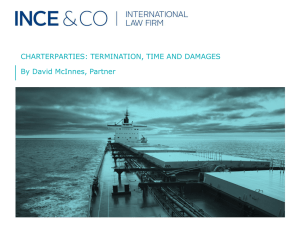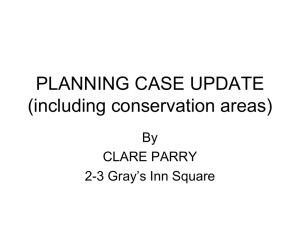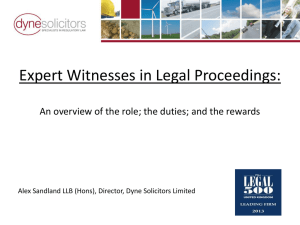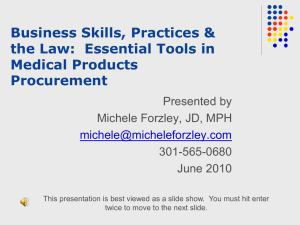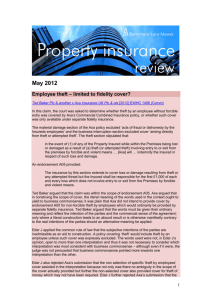here - Cornerstone Barristers
advertisement
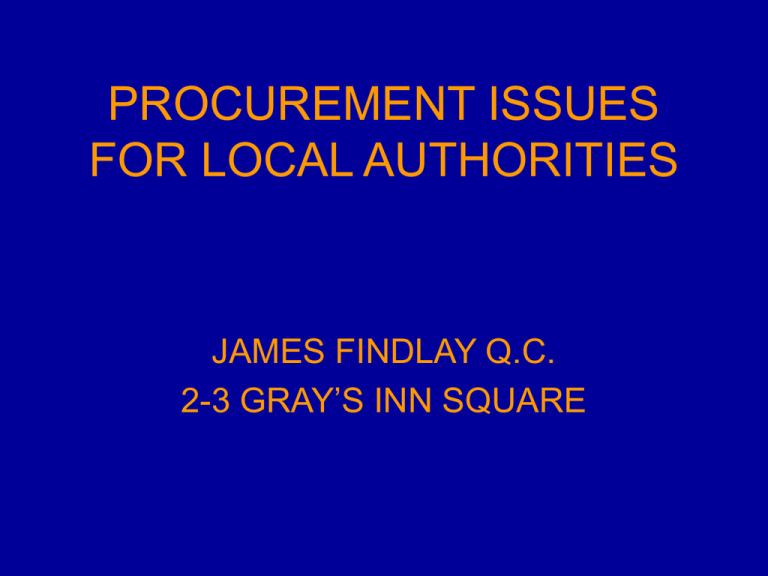
PROCUREMENT ISSUES FOR LOCAL AUTHORITIES JAMES FINDLAY Q.C. 2-3 GRAY’S INN SQUARE Regulation 47(7) – pre-requisites before issuing proceedings • Reg 7(a) The economic operator bringing the proceedings must have informed the operator of the breach/apprehended breach & intention to bring proceedings • Reg 7(b) Proceedings brought promptly & in any event within 3 months of the date when grounds for bringing proceedings first arose – unless the Court considers that there is good reason for extending that period. AMARYLLIS LIMITED v HM TREASURY & OGC BUYING SOLUTIONS [2009] EWHC 962 (TCC) • Claim for £11M arising out of furniture buying on behalf of UK Public Sector Bodies. • Application to strike out claim for (a) failure to give written notice and (b) not within 3 months and in any event not promptly. AMARYLLIS (1) • A general reference to a breach of the regulations is not sufficient. • The notice must identify the actual breach complained of. • Detailed/lengthy particulars are not required, particularly if the proposed Defendant has not responded to requests for information. AMARYLLIS (2) When did the grounds first arise? • Limitation designed to be akin to JR. • Difference of approach Jobsin:Burkett • What matters is when the specific breach of the Regulations actually occurred. That will often be when the actual decision is made to exclude the tenderer. Follows approach in Risk Management Partners v Brent [2008] EWHC 1094. • In the instant case, grounds arose when an irrevocable decision was taken to exclude the Claimant and was so communicated. AMARYILLIS (3) Prompt and in any event within 3 months. • Proceedings were one day within 3 months. • Court gave detailed consideration to the delay, and reasons for it. Risk of alienating an important client is not good reason. Defendant’s conduct relevant. • In any event good reason existed. In that context prejudice to the D was relevant JB LEADBITTER v DEVON CC [2009] EWHC 930 (CH) • Deadlines and late submissions. • 4 case studies required to be submitted before the deadline. By mistake when tender submitted, they were omitted. Claimant tried to rectify before deadline, but could not by reason of the security procedures involved in the process. They were sent by email less than half an hour later. • Alleged Council had powers to waive and should have so done, and acted disproportionately. LEADBITTER (2) • Devon had waived strict requirements in respect of two contractors: - one had suffered a power failure before submitting through no fault of theirs (although it need necessarily have done so) whilst - another had provided hard copies before the deadline as they were uncertain whether they had filed properly online. (Careful not to discriminate if one far away and one close.) LEADBITTER (3) Result • No discrimination found on application of rules. • Contrary to Devon’s submissions, principle of proportionality does apply. (Example of a case of an obvious error in a tender which should have been clarified, disproportionate not to do so.) • But Court will only intervene if decision is unjustifiable and will have regard to the terms of the tender. More likely to be disproportionate if there is a failure to exercise a discretion rather than waive an express term. • A deadline is a deadline, particularly if tender documentation so states. • Danger if you do waive, others might complain FEDERAL SECURITY SERVICES LIMITED v NI COURT SERVICE & ANO. [2009] NIQB 15 • Error discovered in process (about precision of need to hold a licence to provide security services), decision to call off. Challenged. • Claimant alleged whilst authority entitled in certain circumstances to discontinue it had to be proportionate and justified. Federal Security Services • Contract award criteria were not formulated/expressed so as to allow all reasonably well informed/diligent tenderers to interpret them uniformly. • Decision to rerun was proportionate, particularly given care and consideration given to it. • No allegation of improper motivation. CHANDLER v LB CAMDEN & OTHERS [2009] EWHC 219 (Admin) • A mere 202 paragraphs. JR of decision to establish an academy. Paragraphs 116. • Claim refused on standing. Claimant was not an economic operator, nor were issues of equivalence or effectiveness raised.. • Neither was there a legitimate interest, to enable reliance upon rights not directly conferred. • Parents of school age children have no right to challenge. No particular interest in challenge, see paragraph 136. • Rights were only private law rights, could not be raised in a JR action (paragraph 139). • In any event, rules did not apply Austin (R) v PORTSMOUTH CC [2009] EWHC 322 (Admin) Challenge to a CPO seeking to enlist a procurement challenge as well. • Challenge dismissed, amongst other reasons, as (i) no standing and no legitimate interest (ii) remedy only in damages in any event (iii) Amendments to a public contract only constitute a fresh award if materially different in character – which had not occurred here. LIANAKIS C532/06 http://www.ogc.gov.uk/procurement_policy_and_ap plication_of_eu_rules_procurement_policy_note s.asp Procurement Policy Notes/ Quarterly Updates • There is a clear/significant difference between selection and award difference of process. • Selection criteria such as experience and capability must NOT be used at selection stage. Lianakis (2) • First, selection, stage covers minimum levels of economic/financial standing and/or technical/professional ability. • Second, award, stage considers which contract is the most economically advantageous. • More advice is likely due soon. http://www.ogc.gov.uk/procurement_documents_b est_practice_guidance_.asp



